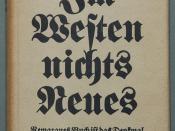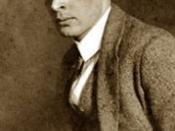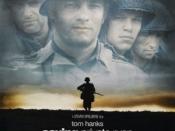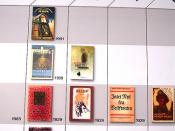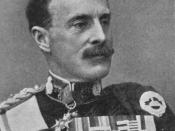An Un-glorified Portrayal of War The year is 1970, and it is the height of the Vietnam War. The U.S. has just sent in a company of five soldiers on a search and destroy mission. Suddenly, twenty Vietnamese soldiers armed with machetes and machine guns attack them. The five soldiers seem impervious to the bullets and knives, as they hold together, and return fire. In less than ten seconds, the enemy soldiers are dead, despite the fact that they had the 4:1 advantage. One of the American soldiers finds that his arm is bleeding, and quickly rips a piece of his uniform off, and ties it around his arm to stem the blood. They continue on as if nothing had happened. Portrayals of war in this fashion were common among the pre-1990 films. American soldiers, the "good guys," were depicted as being invincible, and war was depicted as glorious. After every battle, the soldiers had a one-month leave, and came home to beautiful women and bars.
These portrayals gave the false idea that war was "cool," the good guys always won, and no one ever got killed except for the "bad guys." However, a sudden flood of realism has reached the American public this last decade. We are bombarded with films like Saving Private Ryan and The Thin Red Line, that try to depict war as real as possible, down to the blown kneecaps, decapitated bodies, and blood-soaked fields. Although the novel, All Quiet on the Western Front, was written around 1928, critics have agreed that this novel gave a strikingly un-glorified view of war both emotionally, and realistically.
In war, soldiers not only experience the physical pains, but also the emotional ones. In All Quiet on the Western Front, this is done most graphically and impressively. As described by critic Richard Church, the book is an overwhelming war experience created by an actual soldier in the war. It is like a four-dimensional depiction of the war, brought finally to those who were fortunate enough not to experience it themselves (Gunton 324). The critic goes on to say that one realizes this war, this near-apocalyptic event that spanned a horrible four years, ripped all sense of civilization away from them and trampled it into bloody soil of the trenches (Gunton 324). For example, in the beginning of the novel, a soldier named Detering, longs for his farm and wife, where he just wants to work on his farm, and be at peace, away from all the shelling and gun-fire. Another soldier, Paul, who is also the narrator, goes home, but finds that he is "[not himself] there. There is a distance, a veil between [him and his home]" (Remarque 160 Ch 7).
In addition to showing people things that other novels have made familiar to them, like the trenches, pain, lice and hunger, the book also shows one the inner drama; the fall of a group of schoolmates who were destroyed by the war before the first shell or gun-fire was ever heard (Gunton 325). It showed that hhe war changed the schoolmates from the students they were, to the prematurely aged men they are now; or, as the narrator of the novel says, "young? That is long ago. We are old folk now" (Remarque 18 Ch 1). In a sense, the war has destroyed the youths even before the material weapons in the war destroyed them. In the book, Remarque wanted to put his audience in the mindset of how it felt to fight in the war, and to show them what it did to the youth of the world more than to give them a written documentary on the war. As he says himself, "[m]ore than anything else, the novel represents the emotional impact of the war on the young generation of recruits who fought it" (Magill Vol. 1).
Throughout the first half of the book, Paul and his comrades relate how little of the 10 years in school have helped them, and goes on to say how they have learned more in the few days of the fighting than they have in all their years of schooling. When the war ends, they will go back to nothing, at least not the students. In short, as Albert puts it, "The war has ruined us for everything" (Remarque 87 Ch 5). Through this, Remarque has shown that the war has not only affected the soldiers through wounds and mental pain, but also in the long-run, as they have nothing to go back home to, not back to their previous lives and not back to a normal life, and that is if they survive the war first. As Remarque himself put it, "I have not felt myself called upon to argue about the war"æI merely wanted to awaken the understanding for a generation that more than all the others have found it difficult to make its way back from the four years of death, struggle and terror, to the peaceful fields of work and progress"æ" (Remarque Gale), and this he has done very well.
Critics have agreed that All Quiet on the Western Front is an un-glorified novel that is "thoroughly lacking in all bugle calls, all flag waving, all false patriotism; it is just war" (Discovering Authors Modules). For instance, during Paul's leave in his hometown, there are no bugles, no crowds awaiting him, cheering. However, at a bar, that Paul meets his former German-master, whom talks and congratulates Paul genuinely, but in a naÃÂïve and ignorant way. During this scene, Remarque depicts the German-master as an individual who glorifies war, and believes more in the politics of it than the actual and horrific reality. For example, when he tells Paul that they should just smash right through the French as if they were wooden soldiers, Paul replies that the French have too many reserves, and that "the war may be rather different from what people may think"(Remarque, 167; Ch 7). However, the schoolmaster goes on to say that Paul does not know what the war is like on a whole, and continues his charade about how the Germans must simply smash through the French to achieve peace. Simply is definitely an understatement as Paul thinks to himself, "I would like to know just how he pictures it to himself" (Remarque, 160; Ch 7). Through this, one can see that Remarque did not want to portray the war as a glorious patriotic experience. On prominent reviewer however, General Sir Ian Hamilton of the British army, criticized this aspect of Remarque's book. He said that "there was more to war than Remarque's affecting realism "" for instance, there is patriotism, and the knowledge that life is more than dying for an unknown cause. Nevertheless, [believing] that Remarque had done a splendid job" (Firda 16). Remarque responded by saying that the patriotism was lacking "because the simple soldier never spoke of it" (Firda 16), and that he had wanted to display only the "purely human aspects of war experience" (Firda 16).
At the end of the novel, when more than half of his enlisting class has died, he sees his company commander, who has not been wounded once in his two years of service, die a horrible death as a flying shell fragment smashes his chin, and rips open the hip of Leer, a former classmate. In the end he remarks, "What use is it to him now that he was such a good mathematician in school" (Remarque 284 Ch 11). At last, Stanislaus Katczinsky, Paul's last great friend, dies a most un-glorious, as a random shell fragment flies into the back f his head, and slowly kills him, while Paul hauls him off to the infirmary, all the while unaware that he is dead. All these deaths lack the glorious feeling and taste of the many movies and novels that one may have experienced in the past.
All in all, the novel is inarguably realistic in all senses. Although Remarque himself denies that the novel was a history, the "record of Baumer's activities as a common soldier""and identifiable German enlisted man going through his daily routine, within combat range on the western front, and finally getting killed""is as credible account of an actual wartime experience. From the emotions the soldiers experience when met with the spontaneity and inevitability of death, to the actual wartime realism[look at this]. And as one critic sums it up, "[t]he author's style is unfurbished, unapologetic, unemotional. In its masterful directness, it transmits with almost equal force the whole range of the war's reverberating hell-tones of agony and horror"æ"(Catholic World, Gale). Ultimately, Paul dies as well, with a peaceful face, "as though almost glad the end had come"(Remarque, 284; Ch 11), with "[a]ll quiet on the western front" (Remarque, 296, Epilogue).
